Updated: January 31, 2025
Written by Adam Graham
Adam Graham is a construction industry analyst with experience writing about home construction, interior design, and real estate. As a former member of the Fixr.com editorial team, he collaborated with industry experts and journalists to ensure accurate, up-to-date information for homeowners. His work has been featured in publications such as Better Homes and Gardens, the National Association of Realtors, and Insurance News Net Magazine.
Learn moreReviewed by Adam Graham
Portable generators can prove useful in many situations, providing the power you need in emergencies when the regular supply goes out. They also offer energy and electricity for all your devices during camping trips and outdoor events. There are many types available, ranging in size, voltage, and fuel source, and their prices vary depending on these factors, among others.
The national average cost of portable generators is between $600 and $2,500, with most homeowners paying about $1,200 for a 5,500-watt gas-powered model. On the low end, you could spend $250 on a 1,000-watt gas-powered unit for essentials only, while on the high end of the spectrum, some people spend as much as $7,000 on a 10,000-watt diesel-powered model on wheels.
Portable Generator Price
| Portable Generator Installation Cost | |
| National average cost | $1,200 |
| Average range | $600-$2,500 |
| Low-end | $250 |
| High-end | $7,000 |
Portable Generators Cost by Fuel Type
The average cost of portable generators ranges from $200 to $6,000. There are several factors that affect the cost; namely, the fuel source plays a large role in costing these units. They are divided into categories based on the fuel they use. They most commonly use gasoline, but you can also find models that use liquid propane, natural gas, and diesel fuel. In addition to choosing a unit of the right size, you will have to choose the best fuel source for your needs.

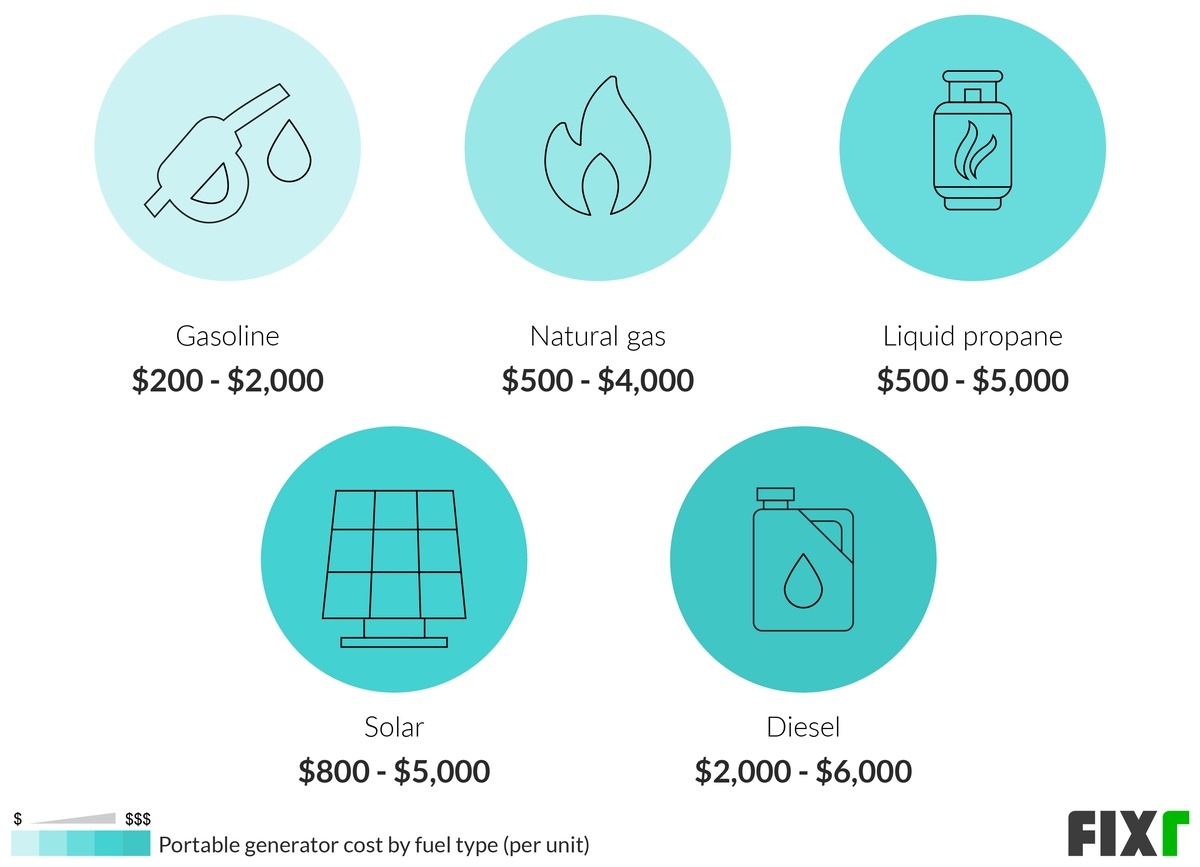
| Fuel Type | Unit Price (Materials Only) |
| Gasoline | $200 - $2,000 |
| Natural Gas | $500 - $4,000 |
| Liquid Propane | $500 - $5,000 |
| Solar | $800 - $5,000 |
| Diesel | $2,000 - $6,000 |
Gasoline Portable Generators
A gasoline-powered portable generator costs between $200 and $2,000. Gasoline-powered units are the most common type used in America and are popular with many due to their affordability and easy access to gas in most regions. On the downside, gas can be difficult to store for long periods of time, especially during the winter or in cold conditions.
Natural Gas Portable Generator
You can expect to spend between $500 and $4,000 on a natural gas portable generator. Natural gas models are an interesting choice for many users because they can be hooked up directly to the gas cables on the utility grid. This means you do not need to store the fuel and always have an accessible supply. This added convenience comes at a cost, however, because natural gas units can be much more expensive than regular gasoline models.
Liquid Propane Portable Generators
Liquid propane portable generators, which cost between $500 and $5,000, are also a convenient option because propane is readily accessible and affordable in many areas. Liquid propane can be stored for many years without worries, but the size and weight of the canisters make it difficult. And, liquid propane models are less durable overall. If you are looking for a unit that will provide longevity, you may want to choose another fuel source.
Solar Portable Generator
The average cost of a solar-powered portable generator ranges from $800 to $5,000, depending on the capacity, features, and other factors. These models are more expensive than other power options but offer the benefit of free fuel. You also will not have the added concern of fumes being expelled into the environment due to running your unit. These units are available in several sizes and deliver power for all types of needs.
Diesel Portable Generators
These generators average between $2,000 and $6,000, depending on their size and features. Diesel portable models are typically the most expensive, but they are often more powerful and efficient than those using other fuel sources. But if you need a unit with high-power output, diesel might be the right choice for you. Several styles and sizes are available. You also have the added benefit that diesel burns cleaner than gasoline.
Portable Generator Price by Power Capacity
The average cost of a portable generator ranges from $200 to $6,000 depending of its power capacity. Models vary enormously in how much power they produce and the efficiency rating they get from their fuel source. Some are much stronger and more efficient than others, able to power multiple large appliances or be used at worksites to power construction equipment. Others are much smaller, designed for use at a campsite to power an electric grill or TV. Homeowners should consider how much power they will need and then find a unit that fits the requirements.


| Wattage | Unit Cost (Materials Only) |
| 2,000 - 3,000 watt | $200 - $500 |
| 5,000 - 8,000 watt | $500 - $2,000 |
| 10,000+ watt | $2,500 - $6,000 |
Portable Generator Price by Brand
The average cost of a portable generator ranges between $200 and $6,000, based on the brand. In addition to power capacity and fuel source, the brand that you choose could also affect the price that you pay for your unit. Some brands only work with one fuel source or type, while other brands offer multiple options. In the table and subsections below, we will look at the most popular brands, their costs, and other considerations.

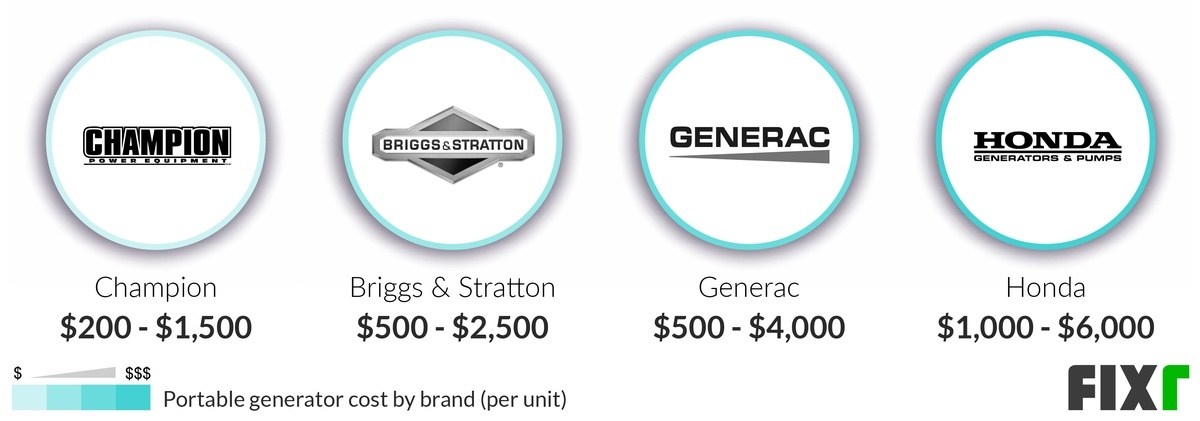
| Brand | Unit Cost (Materials Only) |
| Champion | $200 - $1,500 |
| Briggs & Stratton | $500 - $2,500 |
| Generac | $500 - $4,000 |
| Honda | $1,000 - $6,000 |
Champion Portable Generator
The average cost of a Champion portable generator ranges from $200 to $1,500, depending on the power, fuel source, and other features that different models may offer. Champion models offer a more affordable option and are typically designed for smaller power needs like camping or emergency backup. The available wattages might be more limited than other brands. However, for those who need a functional, affordable unit, this brand delivers plenty of promising models.
Briggs And Stratton Portable Generator
The selection of Briggs and Stratton portable generators available today ranges from $500 to $2,500, depending on the fuel source and the wattage that you choose. Briggs & Stratton is a leader in outdoor power equipment and engines. They offer several different options for people, including several feature-rich models for home use, backup power, and so much more. The smaller systems have more budget-friendly pricing, while larger systems or those using premium power sources will typically be on the higher end of the price range.
Generac Portable Generator
Generac generators range between $500 and $4,000, again depending on the model you choose and the wattage of the unit. Generac makes many commercial products, but they are also among the leaders for residential portable and emergency models. They offer models that run on gasoline primarily, but natural gas and other options also exist. The higher-end systems will have higher wattage and more features, but you can find models for all needs.
Honda Generator
You can expect to spend between $1,000 and $6,000 on your Honda model when you choose this brand. Honda is a name synonymous with quality engines, both on vehicles and outdoor power equipment like generators and lawn and garden units. Honda makes units that primarily run on regular unleaded gasoline, so if you are looking for a different fuel source, this brand may not be at the top of your list. However, for high-end gas-powered models, Honda is a leading brand.
Labor Cost to Install a Portable Generator
The average cost of hooking up a portable generator to house connections ranges from $50 to $100 when a professional electrician does the work. One of the best things about buying one is that it requires little installation. Set up the unit in the right spot, add the fuel, connect it to your devices with an extension cord or transfer switch, and then switch it on. However, if you buy a large model, you may need help carrying it to the right location. And if you are not sure how they work, an electrician can show you the basics and set up the unit for the first time. This should only take an hour or so and will leave you much better prepared.
Install Transfer Switch for Portable Generator
Installing a transfer switch for your unit costs between $200 and $500. The cost of the transfer switch itself ranges from $300 to $500. A transfer switch allows you to power all the major appliances and devices in your home by directly connecting through the circuit breaker box instead of using extension cords. The job takes about three or four hours to complete, depending on the type of transfer switch, generator, and the wiring of your home and circuit breaker box. Once the installation is complete, you can simply flip the transfer switch on the unit and run all of your appliances and electrics without running extension cords to each of them because the unit is hard wired to your circuits.
Cost to Rent Portable Generator
It will cost an average of $50 to $100 per day to rent a portable generator, depending on the size and style of unit that you choose. Some companies will offer weekly or monthly rates at a significant discount for those who need long-term rentals. If you are in a situation where you only need one for a limited time and do not want to spend the money to purchase a unit of your own, it may be more sensible to rent a unit. Be sure to consider the wattage and fuel source when renting because you will also incur the cost of any gasoline, diesel fuel, or natural gas that the unit uses in addition to paying for the unit itself.
How Big of a Portable Generator Do I Need?
It can be complicated, but it is possible to estimate how much power you need from your portable generator. If you plan to use it as a backup emergency power source for your home, you need to identify all the lights, appliances, and devices you want to keep running in case of a power failure. Calculate the wattage for each, using the formula volts x amps = watts. From there, add up the watts for all the devices and find a suitable model. For example, if you discover that all your devices require about 4,500 watts of power, look for a 5,000-watt generator or higher.
Anyone considering buying a portable generator should take size into account. They come in a range of sizes, from small, handheld models that are easy to carry on your own to much larger and bulkier models that require multiple people to move around. Naturally, the larger units have higher power outputs, while the smaller ones are usually limited to about 3kW. Think about how and why you are buying one when choosing a model that works for you. If it is only for camping and simple outdoor events, a smaller model should suffice. But if you have a vehicle capable of transporting a larger unit and require something with more power, you may want to opt for a larger model.
Portable generators can be found in a huge range of power ratings. They start with simple 2 to 3kW (2,000 - 3,000 watt) models, usually small enough to carry around and cost the least. These are best used for campsites and powering just one or two things. The larger 5 to 8kW (5,000 - 8,000 watt) units usually come in larger cart models. These can be used as emergency backups for running a few lights, a water heater, and an appliance or two. For those needing big boosts of power, opt for 10kW+ (10,000 watts) models, which are much larger and usually need wheels on the base to be moved easily. They can be used as a whole-house backup.
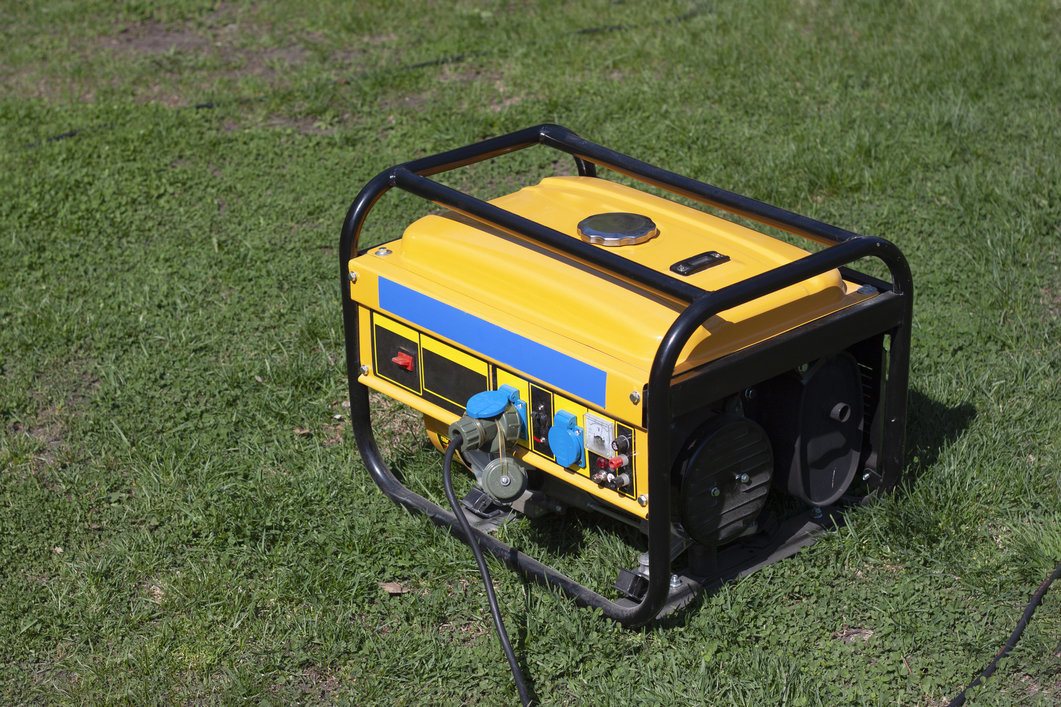
Portable Generators Safety
Portable generators are designed to be as safe as possible, but there are instructions you should follow to ensure that you do not encounter any unnecessary risks when using them. For starters, they should never be operated indoors. They should always be located at least 20 feet away from the home, and the exhaust should be aimed away from the property. Ensure that there is plenty of space around the unit and that the exhaust is not close to any windows, doors, or other structures.
Portable Generators vs Standby Generators
While you can expect to spend $500 to $2,000 for a portable generator, standby generators cost between $2,000 and $20,000. Many people hesitate between getting a portable or a standby model, despite the price difference. There are key differences between these options, and each one has advantages and disadvantages. For example, portable units are more versatile in terms of their usage since they can usually be carried around easily and used at places like worksites and campgrounds. They are also cheaper and more compact overall, with minimal maintenance required.
Standby generators require more maintenance and are more expensive overall but are much stronger and can power the entire home if the power goes out. They run automatically without the need for manual operation or fuel storage, and they can increase your property value. On the downside, they can be noisy, take up a lot of space, and require regular inspections.
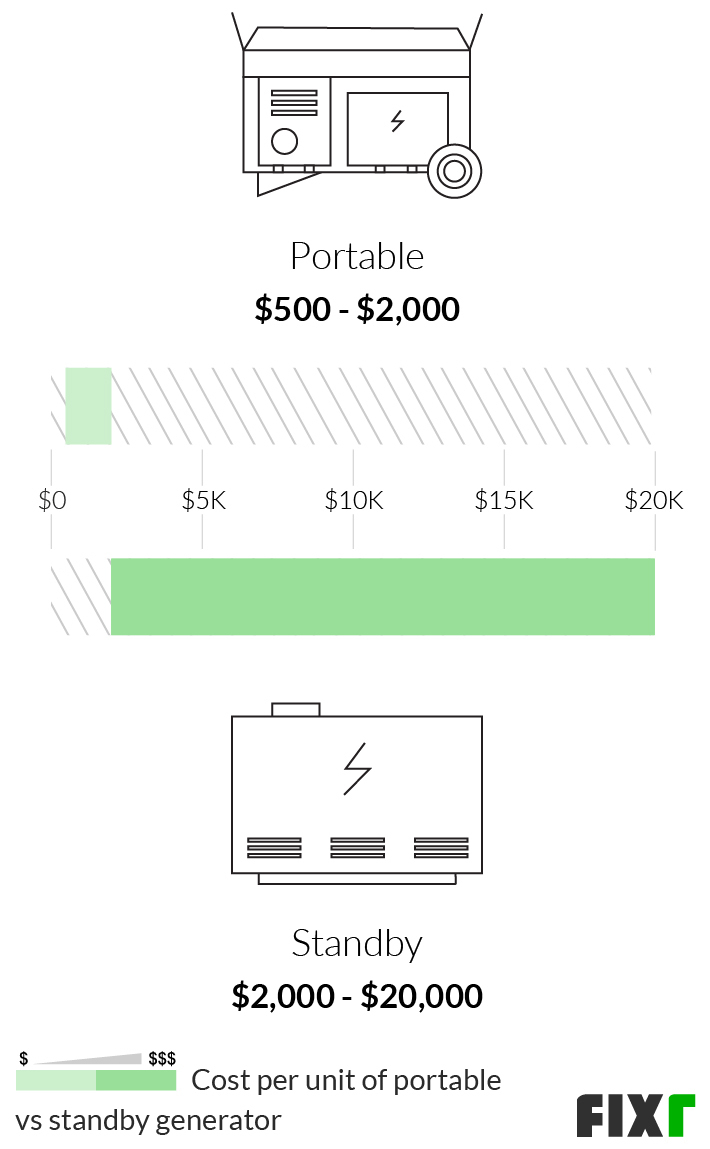
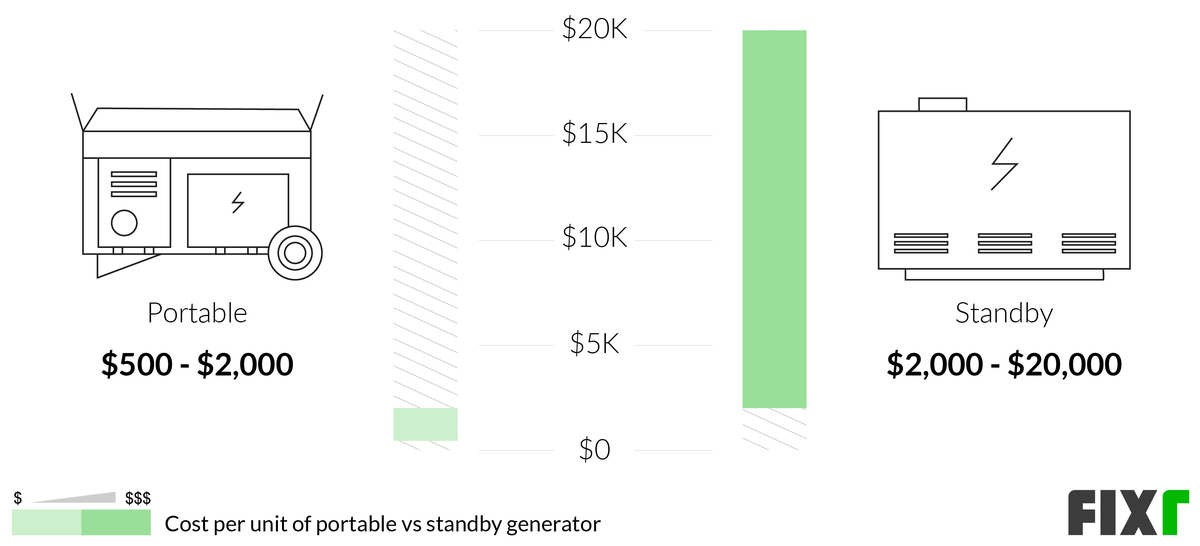
| Unit Type | Unit Cost (Materials Only) |
| Portable | $500 - $2,000 |
| Standby | $2,000 - $20,000 |
Enhancement and Improvement Costs
Portable Generator Extension Cord
You will spend between $10 and $60 per extension cord to outfit your generator with all the cords that it needs to connect to your various appliances and electrics. The simplest way to hook up a portable generator is to use extension cords plugged directly into the unit. Be aware of how many outlets the unit offers. Do not buy a unit that is too small or requires you to double-up on plugs by connecting multiple electrics with a single split-style extension cord. If you are unsure, consult with an electrician about the best setup option.
Portable Generator Wheels
Wheel kits are available for portable generators, at the cost of $25 to $50, depending on the type and size of wheels in question. If your model is large and difficult to lift, installing wheels could make it easier to move the unit from place to place. Many models come with wheels included, but not all. If you find a model that you like without wheels, it may be worth it to purchase the wheel kit separately and install them yourself.
Portable Generator Cover
You should invest in a portable generator cover, which averages $25 to $100, depending on the size of the cover and the material. The style affects the cost. Fitted, brand-specific covers cost more, while generic, one-size cover models may be less expensive. If your unit is stored outdoors or in an outbuilding, you may want to invest in a cover to protect it from constant exposure to the elements and extend its lifespan.
Additional Considerations and Costs
- Safety features. Portable generators can pose real risks to human life. This is why it is important to practice safe-use when working with one. Consider a model with an automatic shutoff feature that shuts down the unit if it detects too much carbon monoxide in the surrounding area.
- Permits. While permits are required for large standby generators, most states do not require permits for portable ones. Check the rules and laws in your state to learn more.
- Storage. Always use portable generators outdoors. They can be stored indoors in a place like a garage or shed when not in use, however. Store all fuel for it, such as propane or gas, separately in specialized containers.
- Maintenance. In general, portable generators do not require much maintenance work, aside from filling up the fuel tank. Inspect it occasionally for signs of corrosion or wear and tear.
- Interlock device. As an alternative, an interlock device is available that works much like a manual transfer switch but at about half the cost. Interlock kits run between $450 and $950 to install, with most people spending $50 to $150 on the device itself and the rest on labor.
- Lifespan. Because generators are not used consistently around the clock, they are aged in hours rather than years. The average model is designed for 1,000 to 2,000 hours of use, while standby models can last for as much as 4,000 hours.
FAQs
- Do you need a permit for a portable generator?
Most cities and municipalities require an electrical permit and a building inspection to ensure that all generators are properly installed. Gas-powered units may also need a Fire Inspector’s approval.
- How much does it cost to hook up a portable generator?
This depends on the method you use. Hooking up a generator with a transfer switch costs between $500 and $1,000, but using extension cords makes it much cheaper. They cost $10 to $60 per cord.
- Can a portable generator run a house?
A portable generator can run most of the essential appliances and services in your house, including water heaters, refrigerators, and lights. Buy one with enough power and have a sufficient supply of fuel for your situation.
- Are portable generators worth it?
If you live somewhere with frequent power outages or storms, having a portable generator can be life-changing. It keeps your household running even when the power goes down. They can also be worth it for frequent campers, outdoor adventurers, and those working in construction.
